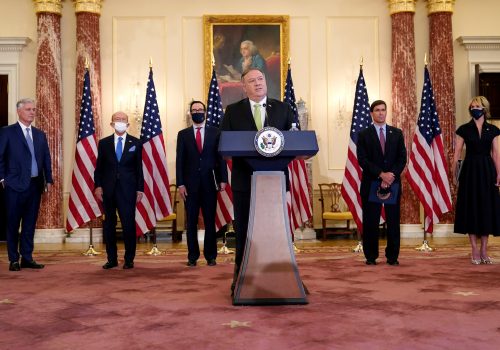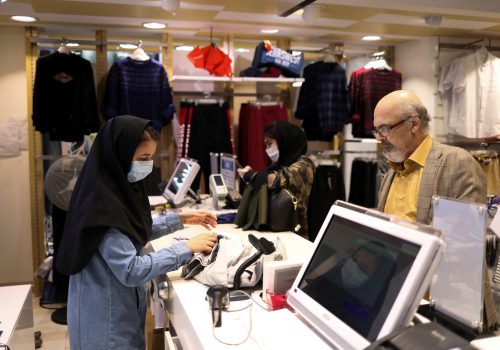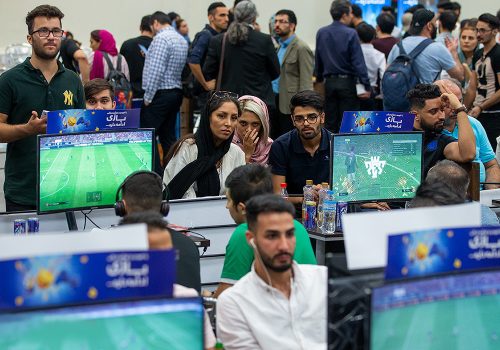New sanctions on Iran’s banks: Crippling or more window dressing?
On October 8, the Trump administration imposed its latest round of sanctions on Iran: bank sanctions it touted in the run-up to the action as crippling and which proponents, including Senators Tom Cotton (R-AK) and Ted Cruz (R-TX), reportedly hope will cause the collapse of Iran’s economy. Setting aside the wisdom of trying to collapse an economy in the middle of a COVID-19 resurgence, the goal of blacklisting the rest of Iran’s financial sector has been a stalking horse for hardliners for some time.
The latest round of sanctions, somewhat predictably, are more window dressing than anything of strategic import, as Iran’s banking sector was already subject to a substantial level of sanctions. Instead, the sanctions may be more directed at creating difficult conditions for the resumption of the Iran nuclear deal under a potential Joe Biden administration. However, that is not to say that there will be no impact. Indeed, the Iranian rial fell even further against the US dollar in the aftermath of the sanctions—an event that harms ordinary Iranians as well as the government. Policy actions like these are a continuation of a foreign policy toward Iran that appears characterized by spite rather than achievable policy ends.
The October 8 sanctions targeted seventeen Iranian banks for operating in Iran’s financial sector and one for weapons of mass destruction (WMD) proliferation. Treasury Secretary Steve Mnuchin announced that a primary consideration was stopping Iran’s “illicit access to US dollars.” Secondary sanctions now apply to all large Iranian banks—only primary sanctions had applied to these banks before under a separate sanctions executive order. This may seem like a major escalation, but most international trade with Iran was already subject to secondary sanctions in practical terms, so the effect of those newly relevant secondary sanctions is likely to be limited.
Moreover, foreign trade requires access to foreign currency reserves, most of which are held by the heavily sanctioned Central Bank of Iran (CBI). It is possible that these newly-sanctioned banks were able to conduct some smaller trade transactions without tapping the CBI—and therefore bringing US secondary sanctions into play—but at a strategic level it is hard to understand how these banks could be conducting any significant trade in areas covered by US secondary sanctions anyway. Finally, Iran’s malign activity was already subject to secondary sanctions, so this action will do nothing to curb Iran’s ballistic missile development, support for terrorism, and other troubling behavior.
The wild card in assessing impact, though, is the chilling effect that specific sanctions like these may have on all transactions with these banks, including trade that is exempt from sanctions or authorized. The Treasury Department was very clear in announcing that these banks remain eligible for humanitarian trade, but experience with Iran sanctions during the Trump administration shows that even authorized humanitarian trade has been curtailed despite the legal authorization on paper. This is because of the general perception of sanctions risk and the Trump team’s extremely aggressive approach to Iran. Treasury statements and FAQs can only do so much to overcome the rhetoric of President Donald Trump and Secretary of State Mike Pompeo.
It is possible that humanitarian trade would not be more significantly impaired because it mostly flows through channels that involve the CBI anyway. Furthermore, the international community already went through a similar kabuki dance when the CBI was designated under terrorism authorities and, subsequently, given a general license for humanitarian transactions at the outbreak of the COVID-19 crisis. But that risk of further inhibiting critical humanitarian trade without any real effect in tamping down Iran’s malign activity makes pronouncements by Pompeo on how the United States stands with Iran’s people ring hollow.
One other area where there is unknown impact is whether any of the banks sanctioned will be cut off from the world’s predominant bank-to-bank messaging system, the Society for Worldwide Interbank Financial Telecommunications (SWIFT). The United States has secondary sanctions that target financial messaging services to banks that have been sanctioned for terrorism or WMD reasons. De-SWIFT-ing has long been a rallying cry in the sanctions world, but it is hardly the silver bullet many presume it to be. Not having access to SWIFT can make communications more difficult for banks, but is not crippling, especially for banks that have been subject to sanctions for so long.
It is clear that these financial messaging sanctions apply to the one bank designated under WMD authorities—Hekmat Iranian Bank. Some commentators have pointed to the reference in the underlying sanctions executive order used to target the other sixteen as a justification for extending this prohibition. The Treasury Department did not address the issue in its press release or written guidance, but I am skeptical that such sanctions will apply.
All in all, the above hardly seems “crippling” or indicative of impending economic collapse. Instead, the real goal with this action may have been to appease those in Congress calling for tougher action and to complicate any attempt by a prospective Biden administration to re-enter the Joint Comprehensive Plan of Action (JCPOA). The Biden campaign has made clear that if Iran returns to compliance with the nuclear commitments under the JCPOA, a Biden administration would also return to compliance by lifting sanctions enumerated in the deal.
However, the prospect of simply lifting sanctions is complicated by the overlapping new authorities the Trump administration has imposed and the spate of designations. Many of the Trump administration’s sanctions on Iran have been for activity that would have remained sanctionable under the JCPOA, such as human rights abuses, ballistic missile development, and support for terrorism. Iran likely would demand that all sanctions imposed under Trump be lifted in exchange for returning to compliance on the nuclear front, but that approach gets more and more complicated every time Trump imposes sanctions, given the political sensitivities around the deal in the United States.
It is hard to imagine Congress sitting idly by if a Biden administration pledges to lift terrorism-related sanctions imposed for fully legitimate reasons under Trump and which very well may have been imposed under a Hillary Clinton administration had 2016 turned out differently. The majority of the banks sanctioned in the October 8 action were not related directly to terrorism, WMD threats, or other specified bad behavior, but muddying the waters this way makes life harder for a President Biden who clearly wants to stabilize the situation with Iran. It may well be a strategy that works.
Brian O’Toole is a nonresident senior fellow with the Atlantic Council’s Global Business and Economics Program. He is a former senior adviser to the director of the Office of Foreign Assets Control (OFAC) at the US Department of the Treasury. Follow him on Twitter @brianoftoole.
Image: An Iranian woman wearing a face mask crosses a street after Iranian authorities made it mandatory for all to wear face masks in public following the outbreak of the coronavirus disease (COVID19), in Tehran Iran October 10, 2020. Majid Asgaripour/WANA (West Asia News Agency) via REUTERS


